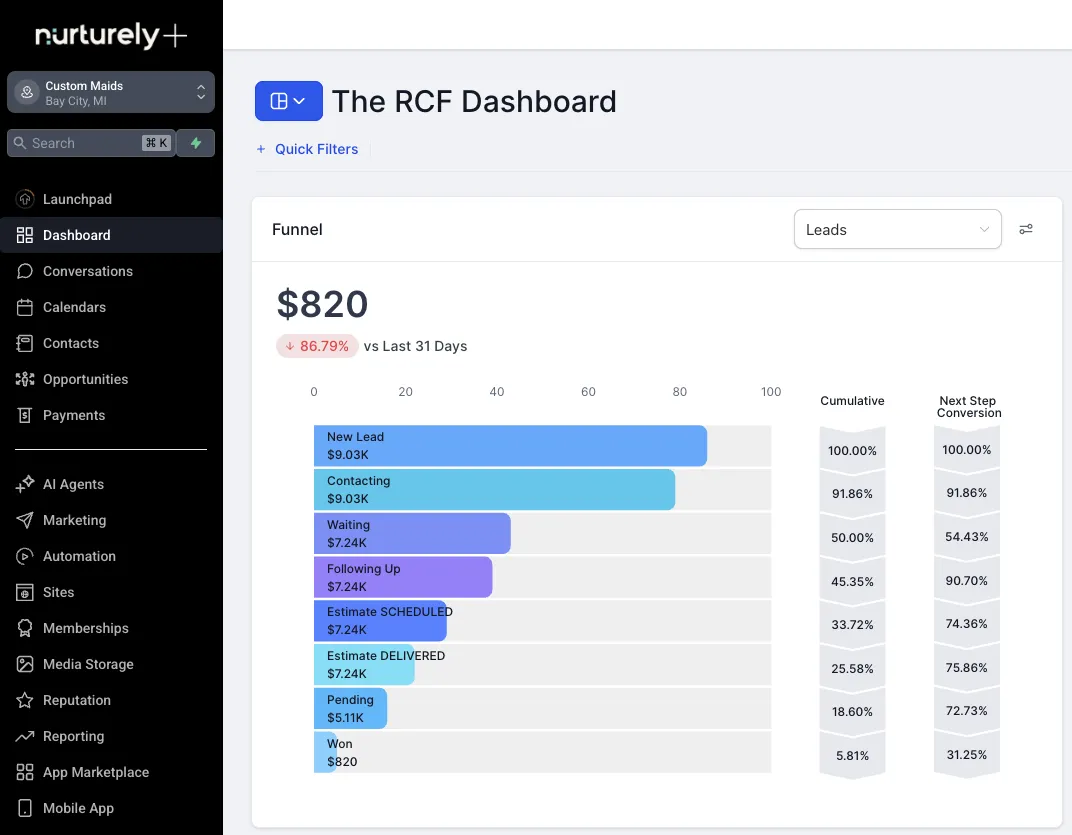How To Start a Pressure Washing Business
Start a Pressure Washing Business: Your Complete Guide
So, you're thinking about starting a pressure washing business. It's about more than just buying a high-powered washer and blasting dirt off a driveway. The real secret sauce is in the prep work: smart planning, digging into your local market, and hammering out a solid business plan.
This is the stuff that separates the pros who build a real, long-term business from the folks who end up with an expensive hobby collecting dust in the garage.

Table of Contents
Start a Pressure Washing Business: Your Complete Guide
Building Your Business Foundation
Getting to Know Your Local Market
Creating a Practical Business Plan
Realistic Startup Cost Breakdown
Securing Your Legal and Insurance Shield
Choosing Your Business Structure
Making It Official with Registration and Permits
Why Business Insurance Is Non-Negotiable
Choosing Your Pressure Washing Arsenal
Hot Water vs Cold Water Pressure Washers
Must-Have Accessories for Profitability
Marketing That Gets Your Phone Ringing
Your Simple, Effective Website
Old-School Marketing That Still Wins
Pricing Your Services with Confidence
Executing Flawless Jobs and Earning Raving Fans
Avoiding Costly Mistakes on the Job
Customer Service That Creates Repeat Business
How Much Can I Realistically Make in My First Year?
Building Your Business Foundation
Before you get lost in the world of PSI and GPM, you have to treat this like the serious business it is. Success isn't an accident. It's built on a foundation of knowing your turf and figuring out exactly where you fit in.
This early planning phase dictates everything that comes next—what gear you buy, who you market to, and how much you charge. A lot of guys skip this, and it's why they struggle, jumping from one low-paying job to the next without any real momentum.
Getting to Know Your Local Market
Your first real job is to become an expert on the pressure washing needs right in your backyard. Don't just assume every homeowner wants their siding cleaned. You need to dig deeper to find where the real money is.
Take a drive around. What do you see? Sprawling suburbs with miles of vinyl siding and long concrete driveways? Or are you in a more built-up area packed with commercial storefronts, restaurants with greasy patios, and walls that are magnets for graffiti? Each one is a different playground with its own opportunities.
Going Residential: This is your bread and butter—driveways, siding, decks, fences, and maybe even roof washing. It's usually the easiest way to get your foot in the door and build a high volume of jobs.
Focusing on Commercial: Think bigger. We're talking restaurants, retail shops, gas stations, and office buildings. These jobs are often larger and can turn into steady, recurring contracts that pay the bills every month.
Finding an Industrial Niche: This is more specialized work. It could be cleaning heavy machinery, a fleet of delivery trucks, or even manufacturing plants. This often requires beefier equipment, like hot water units, but the payoff can be huge.
Once you have a feel for the landscape, it’s time to size up the competition. A quick Google search for "pressure washing near me" will show you who you're up against. Check out their websites. What services are they pushing? What are customers saying in the reviews? Look for the gaps they're leaving open for you to fill.
The key to breaking into the pressure washing game is finding an underserved niche. If every other company is fighting tooth and nail over residential driveways, maybe you can become the go-to expert for post-construction cleanup or commercial fleet washing. This is how you find your unique selling proposition (USP).
Creating a Practical Business Plan
Look, a business plan doesn't need to be a 100-page novel. For a startup, it's your roadmap. It keeps your decisions grounded and stops you from chasing shiny objects.
Simply outline your core services, who your ideal customer is, and what your pricing will look like. This is also where you'll crunch the numbers on your startup costs and make some realistic revenue goals. As you get your operations in place, using a tool like appointment scheduling software can be a game-changer for managing your calendar and cutting down on no-shows.
The good news is you're jumping into a growing industry. The global pressure washer market was valued at around $2.31 billion in 2025 and is on track to hit $3.01 billion by 2032. That tells you the demand for what you do is strong and getting stronger.
Your plan should also map out your day-to-day operations. Think through how you'll handle incoming calls, send out quotes, and manage invoices. Getting this sorted from the beginning will save you a world of headaches later on. In fact, finding smart ways to automate data entry is a pro move that keeps your back-office work from eating up all your time, letting you focus on what really matters: doing great work for your clients.
Realistic Startup Cost Breakdown
A practical look at the potential one-time and ongoing expenses to budget for when launching your business.

Remember, these are just estimates. You can get started on the lower end by buying used equipment and handling marketing yourself, but always budget for quality where it counts—your washer and your insurance.
Securing Your Legal and Insurance Shield
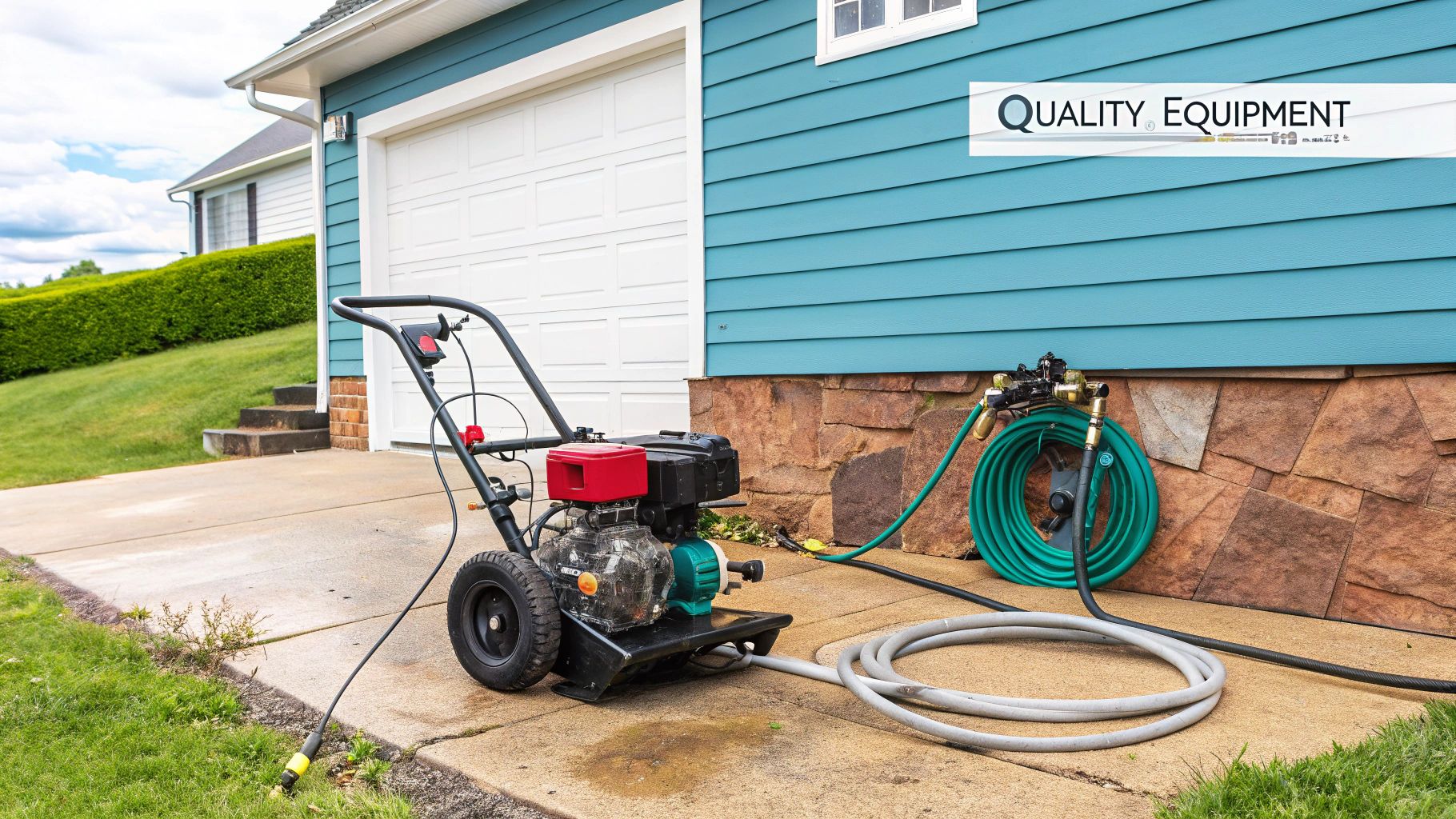
Alright, while picking out your pressure washer and nozzles is the fun part, let's talk about the single most important thing you'll do to protect your new business: getting the paperwork right. This isn’t just about checking boxes. This is the professional shield that separates your business life from your personal life, protecting your home, your savings, and your future.
Thinking about the legal stuff from day one saves you from massive headaches later. Honestly, ignoring it is like getting on a roof without a safety harness—you might be fine for a while, but when something goes wrong, it goes very wrong.
Choosing Your Business Structure
Your first real decision is how to structure your company legally. This choice impacts everything from how you pay taxes to whether your personal car is at risk if a job goes south. For most new pressure washing businesses, it really comes down to two main options.
A sole proprietorship is the absolute simplest and cheapest way to get started. You and your business are one and the same in the eyes of the law. This makes tax time easy (you just report business income on your personal return), but it’s a double-edged sword. It means your personal assets—your house, your truck, your savings account—are on the line if the business gets sued.
An LLC (Limited Liability Company) is exactly what it sounds like: it creates a legal wall between you and the company. If a client sues, they sue the LLC's assets, not your personal ones. For a business that involves blasting high-pressure water around someone's most valuable asset, this protection is critical. Yes, it takes a bit more paperwork and a small filing fee, but the peace of mind is worth every penny.
Pro Tip: For a business using high-powered equipment on other people's property, forming an LLC is almost always the smart move. The small upfront cost is a tiny price to pay for shielding your personal financial world from a business mishap.
Making It Official with Registration and Permits
Once you’ve picked a structure, it’s time to make it official. These are the steps that turn your idea into a legitimate business that the government and your customers will take seriously.
Register Your Business: This is where your company becomes a real entity. If you're going with an LLC, you'll register your business name with the state. If you’re a sole proprietor but want to use a professional name like "Aqua Bright Power Washing" instead of just your own name, you'll need to file for a DBA ("Doing Business As").
Get an EIN: Think of an Employer Identification Number (EIN) as a Social Security number for your business. It's completely free from the IRS website and you'll need it to open a business bank account, file business taxes, or hire help down the road.
Check Local Permits: Every town, city, and county has its own set of rules. You’ll likely need a general business license, and you might even need specific permits for water runoff or environmental compliance. The best way to find out is to visit your local city hall's website or just give them a call.
Why Business Insurance Is Non-Negotiable
If there is one expense you absolutely cannot skip, it’s insurance. Working without it is a gamble that, sooner or later, you will lose. All it takes is one stray rock cracking a double-paned window or a chemical mix that discolors a patch of siding to wipe out your profits for months—or shut you down for good.
Your insurance policy is your ultimate safety net. It also screams "professional" to potential customers. This investment is even more critical when you consider you're about to start a pressure washing business in a booming market. Valued at USD 3.28 billion in 2024, the global market is expected to rocket to USD 4.73 billion by 2033, with North America leading the charge. As the industry grows, so does the need for pros who are properly insured. You can dig into the market's bright future on Straits Research.
Here’s the essential coverage you should have from day one.

Choosing Your Pressure Washing Arsenal
Alright, let's talk gear. Your equipment is the absolute heart of your operation, and making smart choices here is the difference between a profitable day and a frustrating one. When you're just starting a pressure washing business, it’s easy to get buried in technical specs. We’re going to cut through that noise and focus on what actually drives results and revenue.
Think of your core machine not just as a tool, but as your primary employee. A cheap, unreliable unit from a big-box store will constantly call in sick, costing you money and jobs. A robust, professional-grade machine, on the other hand, shows up ready to work every single day.
Decoding PSI and GPM
The two most important metrics you'll see are PSI (Pounds per Square Inch) and GPM (Gallons Per Minute). So many beginners get fixated on PSI, thinking more pressure is always better. That's a rookie mistake. In the real world of professional cleaning, GPM is almost always the more critical number.
PSI is the force. High PSI is great for blasting tough, caked-on grime from hard surfaces like concrete. But crank it too high, and you can easily shred softer materials like wood, vinyl siding, or window seals.
GPM is the flow. Higher GPM means more water hitting the surface, which lets you rinse away dirt and soaps much, much faster. This is the key to job site efficiency.
A machine with high GPM will clean a big driveway in a fraction of the time it would take a high-PSI, low-GPM homeowner unit. For most professional work, a machine that pushes at least 4 GPM is the industry standard. It's a solid, money-making starting point.
Hot Water vs Cold Water Units
Your next big decision is whether you need a hot water or a cold water unit. The right choice here depends entirely on the kind of work you plan on chasing.
Most new businesses should start with a cold water unit. It's the undisputed workhorse for residential and general cleaning jobs—perfect for removing organic stains like mold, mildew, algae, and dirt from siding, driveways, and fences. They're also cheaper to buy, lighter, and easier to maintain. For a startup, it's the smartest first investment.
A hot water unit is a specialized tool for a specific problem: grease and oil. The heat acts as a powerful cleaning agent, melting away greasy, oily messes that cold water would just smear around. If you’re serious about landing commercial clients like restaurants (for greasy dumpster pads), gas stations (for oil-stained concrete), or industrial shops, a hot water machine is non-negotiable.
To make it simple, here’s a quick breakdown to help you decide where to put your money first.
Hot Water vs Cold Water Pressure Washers

My Advice: Don't break the bank on a hot water unit if you’re just starting out in residential. Get a top-tier cold water machine first. You can always rent a hot water unit for the odd greasy job or upgrade your rig once you've landed consistent commercial contracts to justify the expense.
Must-Have Accessories for Profitability
The pressure washer itself is only half the battle. The right accessories are what separate the pros from the amateurs—they let you work faster, produce better results, and make more money per hour. Skimping here is a classic mistake I see all the time.
Surface Cleaners: This is the single most important accessory you will buy. It's a spinning bar with nozzles inside a circular housing that glides over flatwork. It lets you clean driveways and patios in clean, uniform passes, turning a four-hour job into a one-hour job. No streaks, just pure profit.
Nozzle Variety: Your machine comes with a few basic tips, but a full set is crucial for protecting property. The different spray angles (0°, 15°, 25°, 40°, and soap nozzles) give you total control, from carefully blasting a curb to gently rinsing delicate siding.
Wands and Lances: A telescoping wand is a game-changer. It lets you safely reach second-story siding and high peaks without climbing a ladder, which dramatically improves both your safety and your speed on the job.
Quality Hoses: Invest in at least 150 feet of non-marking pressure hose. This lets you park your rig on the street and easily walk around an entire house without having to drag your heavy machine with you.
The gear is critical, but keeping it busy is what matters. This chart shows where new pressure washing businesses typically get their leads from.
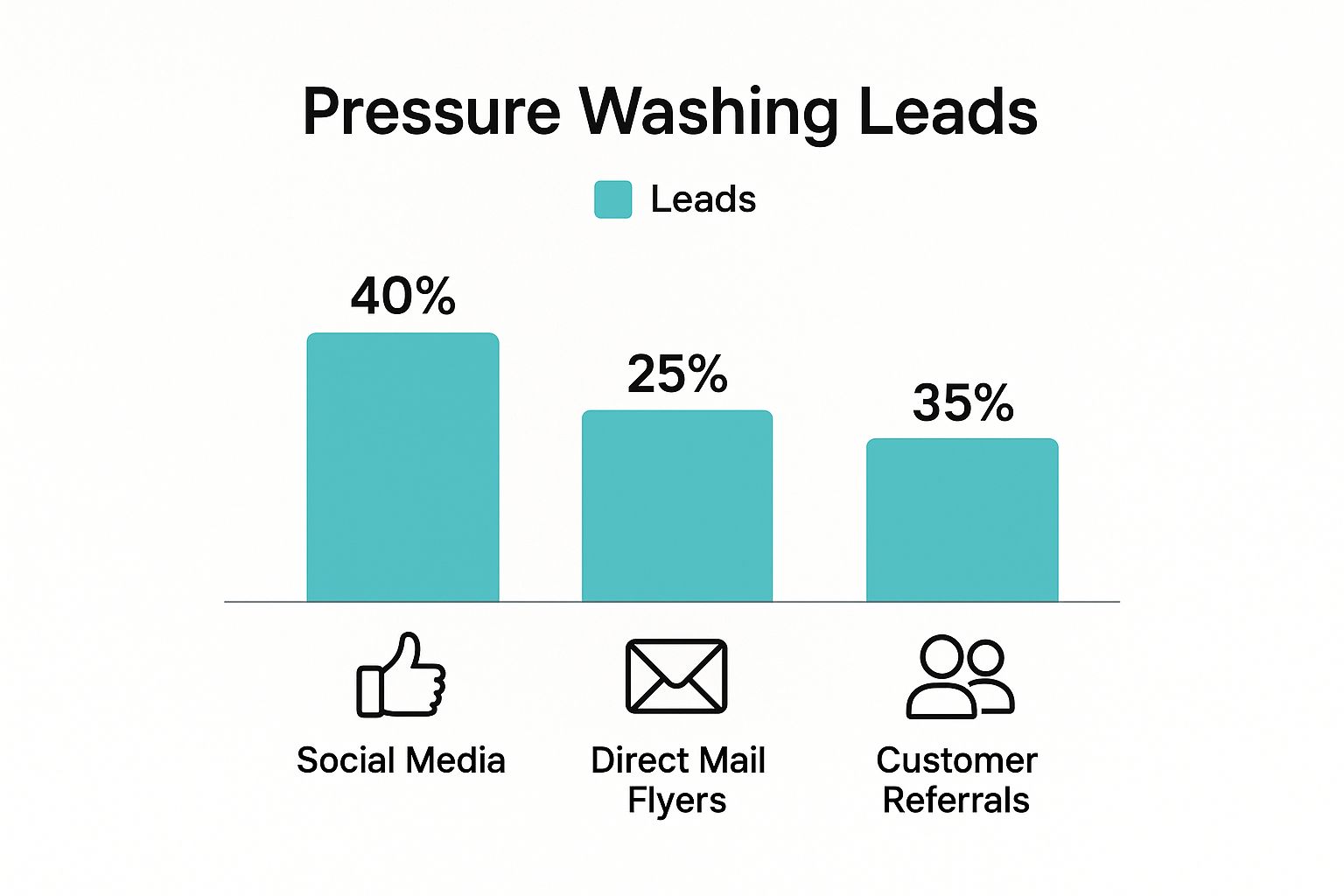
As you can see, you can't just rely on one thing. A healthy mix of online marketing and old-school relationship building is what keeps the phone ringing for a new service business.
Chemicals and Safety Gear
Last but not least, you need the right cleaning solutions and personal protective equipment (PPE). Professional washing isn't about brute force; it's about chemistry. We use the right detergents to break down stains so we can clean effectively with lower, safer pressure. This is called soft washing.
For your chemical arsenal, start with the basics. Sodium hypochlorite (the main ingredient in pool shock and bleach) is the industry's go-to for killing mold, mildew, and algae. You'll also need a good surfactant—a specialized soap that helps your cleaning mix cling to vertical surfaces and penetrate deep into the grime.
And finally, your safety is non-negotiable. High-pressure water can inject straight into your skin, and these chemicals are no joke. Never, ever work without your PPE.
Eye Protection: Wrap-around safety glasses or goggles are a must.
Gloves: Chemical-resistant gloves will save your skin.
Waterproof Boots: Get steel-toed, non-slip boots. Your feet will thank you.
Hearing Protection: Gas engines are screaming loud. Protect your hearing on long jobs.
Marketing That Gets Your Phone Ringing
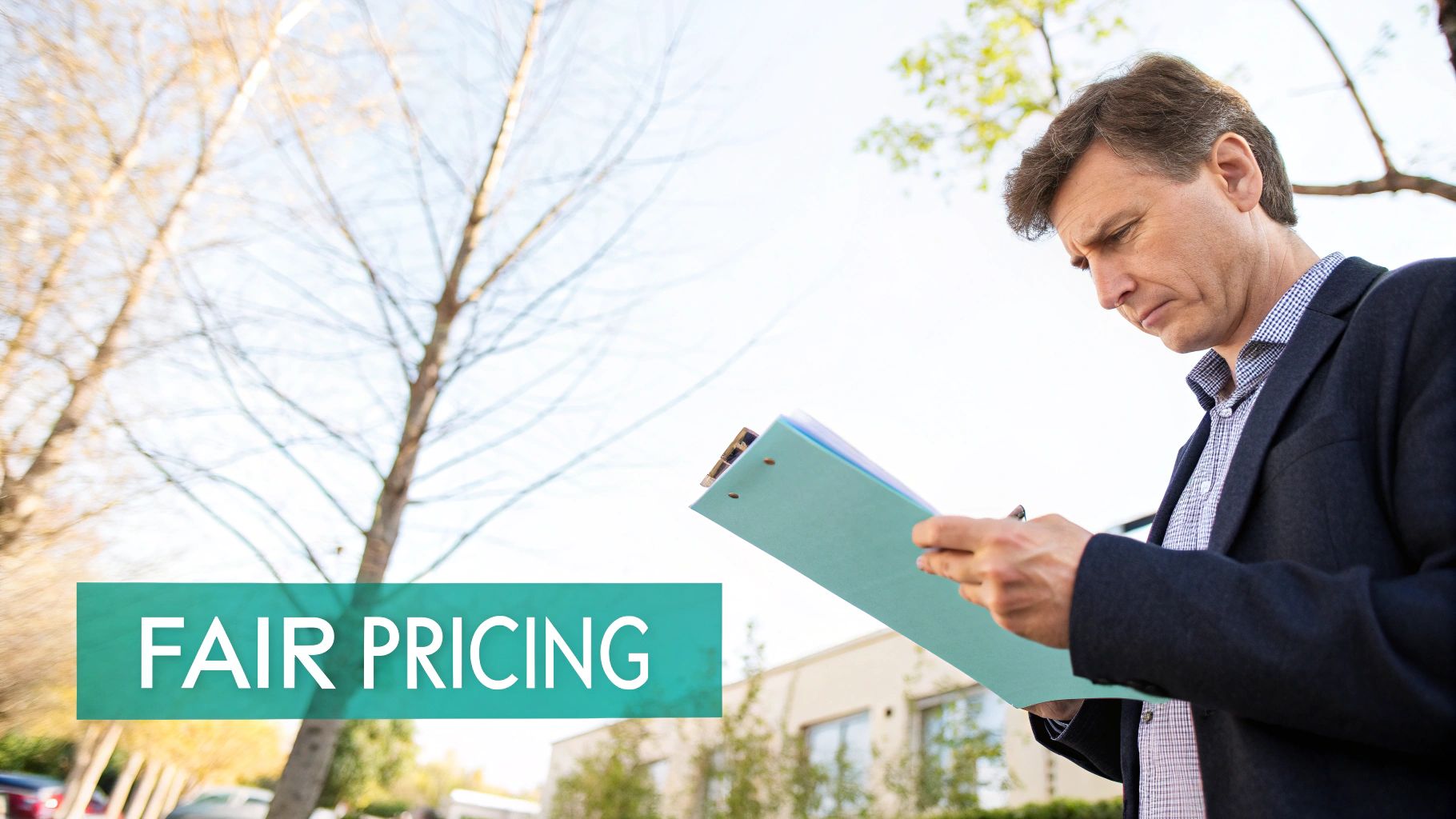
Let's be real. The best pressure washer in the world is just an expensive garage ornament without a steady stream of paying customers. When you're just starting out, forget flashy, expensive ad campaigns. Your early marketing needs to be all about low-cost, high-impact tactics that get your phone ringing this week.
This is your playbook for turning local homeowners into loyal clients. It's a mix of smart digital moves and proven, old-school methods that just flat-out work.
Build Your Digital Storefront
In today's world, your online presence is your new storefront. Period. When a homeowner looks at their siding and sees those ugly green streaks, their first move is grabbing their phone to search "pressure washing near me." If you don't show up, you don't exist.
Your absolute first priority is a Google Business Profile (GBP). It's free, and it's the single most powerful tool for getting found in local searches and on Google Maps. Don't just set it up—fill out every single section. Your services, service area, hours, phone number... all of it.
But the real magic of your GBP is in the photos and reviews. After every single job, upload stunning before-and-after pictures. This visual proof is your best salesperson. Then, make it a non-negotiable habit to politely ask every happy customer for a 5-star review.
Your Simple, Effective Website
Next up, you need a website. It doesn’t have to be some complex, award-winning masterpiece. But it absolutely must look professional and work perfectly on a phone. Its main job is to show off your best work and make it stupidly easy for people to contact you.
Make sure your site prominently features:
A killer gallery of high-quality before-and-after photos.
A clear list of what you do (e.g., driveway cleaning, house washing, deck restoration).
Your service area and a phone number that someone can't possibly miss.
A simple "Request a Free Quote" form.
This one-two punch of an optimized GBP and a clean website builds instant credibility and becomes your 24/7 lead machine.
A potential customer’s trust in your business often begins online. A professional, photo-rich website paired with a well-maintained Google Business Profile signals that you are a serious, reliable operator, not just a guy with a pressure washer.
Old-School Marketing That Still Wins
While having your digital ducks in a row is crucial, don't sleep on the classic, boots-on-the-ground marketing that built this industry. These methods work because they put your brand right in front of the right people at the perfect time.
Targeted Door Hangers & Flyers: The "spray and pray" approach is a total waste of money. Be strategic. The moment you finish a job, take 15 minutes and put door hangers on the 10-15 houses nearby. The neighbors will see your truck and the incredible results next door, making your flyer instantly relevant.
"We're in Your Neighborhood" Signs: A simple yard sign that says "Another Quality Cleaning by [Your Company Name]" with your phone number is a silent but deadly marketing tool. It screams social proof and builds brand recognition in the exact communities you want to own.
This multi-channel approach is how you land those critical first clients. You can find even more proven techniques in our detailed guide on how to get cleaning clients.
Pricing Your Services with Confidence
Pricing can be one of the most nerve-wracking parts of starting. Go too high, and you scare people off. Go too low, and you're on a fast track to burnout. The key is to stop guessing and create a standard price list for your most common jobs.
Create a cheat sheet for yourself based on square footage or just a flat rate for typical residential stuff. For example:
Standard 2-Car Driveway: $125 - $200
Small Wooden Deck (under 250 sq. ft.): $150 - $250
House Wash (single story, under 2000 sq. ft.): $350 - $550
For big commercial jobs or anything complex, you'll need to quote on-site. The confidence you project is just as important as the number. Walk the property with the client, point out the problem areas, and explain your process. This showcases your expertise and justifies every penny of your price.
The market for these services is strong and getting stronger. Projections show the pressure washer industry is set to expand from USD 3.19 billion in 2025 to USD 4.03 billion by 2030. That's a clear signal of massive consumer demand for property maintenance.
To really get the phone ringing and turn one job into five, consider exploring some tailored SMS marketing strategy tips for small businesses. It's a fantastic way to send appointment reminders and follow up for those all-important reviews, turning one-time customers into repeat business.
Executing Flawless Jobs and Earning Raving Fans
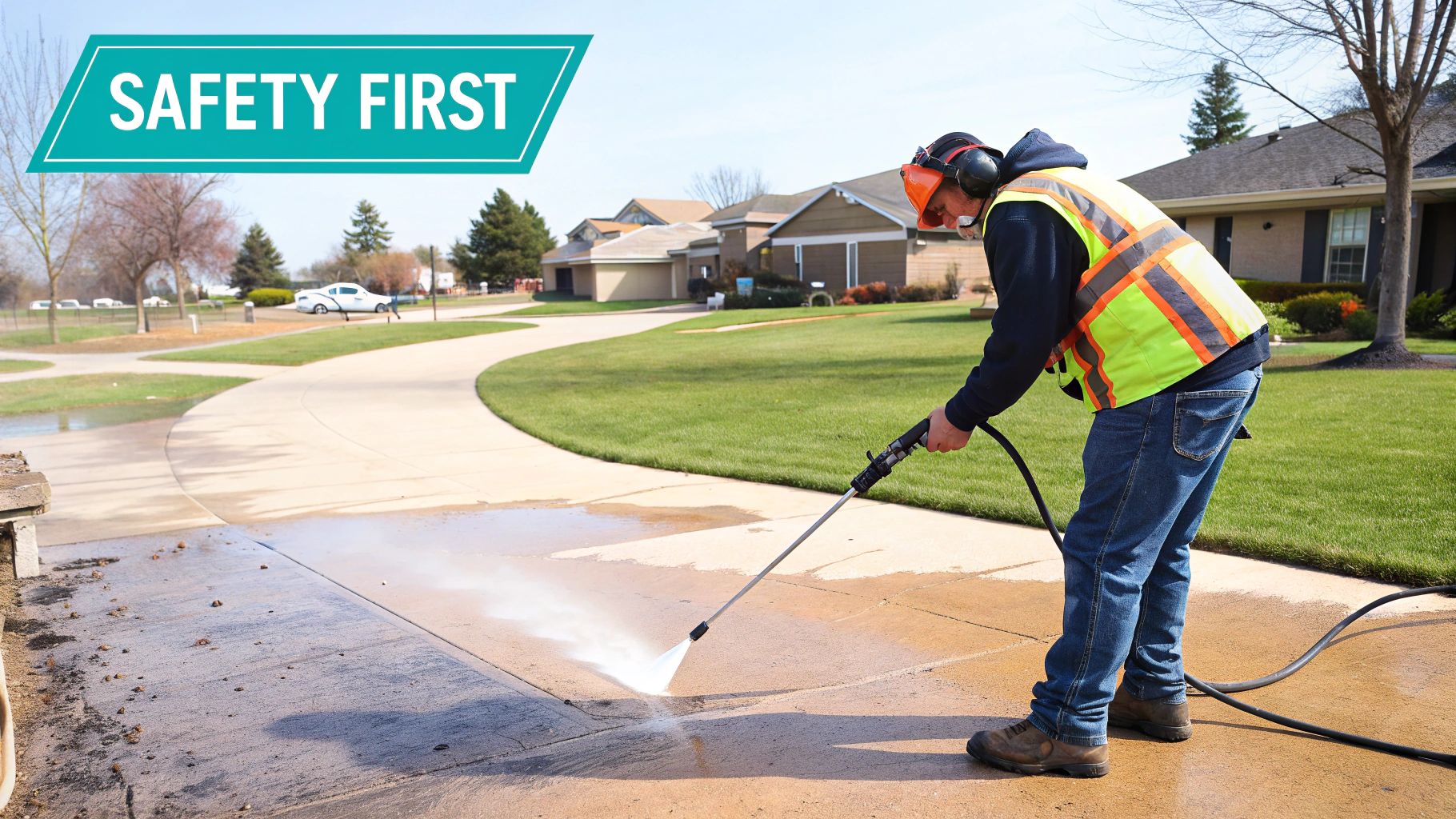
You've got the gear, the phone is ringing, and now it's time for the moment of truth. This is where you actually build a business. Delivering a jaw-dropping result is what turns a one-time customer into a lifelong fan who tells all their neighbors about you.
Doing a great job isn't just about the cleaning itself. It’s the entire experience, from how you answer the phone to the final handshake. Your reputation is forged on the job site, one house at a time.
The Professional Job Workflow
Every single job needs to follow a system. A repeatable process doesn't just guarantee quality work; it screams "professional" to your client. It shows them they hired a real expert, not just some guy who bought a pressure washer last week. A solid workflow minimizes mistakes and makes you way more efficient.
Think of it this way: your process kicks off the second a lead contacts you. But once you're on-site, the real show begins. A structured approach builds confidence and, more importantly, protects the client's property.
Here's how a typical house wash should go down:
The Initial Walk-Through: Before you even think about starting your machine, walk the property with the homeowner. This is your chance to listen. Ask about their main concerns, point out the bad spots like heavy algae or oil stains, and set clear expectations.
Site Prep (Don't Skip This!): This is the step that separates the pros from the amateurs. Protect the property. Tape up every electrical outlet, cover delicate light fixtures, and move or cover plants, patio furniture, and doorbells. It takes a few extra minutes, but it's a non-negotiable part of the job.
Pre-Soak the Surfaces: Get your cleaning solutions on the house and let them sit for a bit. This is called "dwell time," and it lets the chemicals do the hard work. They'll break down all the grime and organic growth so you can use lower pressure, which is always safer.
The Main Event: Cleaning: Now you wash. Using the right nozzles and techniques for each surface, you clean everything methodically. This is where your skill shows. Aim for a perfect, streak-free finish.
Rinse and Clean Up: A thorough rinse is critical. Hit all the surfaces, making sure to rinse landscaping and windows, too. Once that's done, pack up your equipment, remove all the tape and coverings, and leave the property looking better than when you arrived.
The Final Walk-Through: Go get the homeowner and walk the property with them one last time. Point out the transformation. This is your moment to make sure they are 100% satisfied before you even think about packing up the truck.
Your job isn't just to clean a house; it's to protect a client's most valuable asset. The care you take during site prep and the final walkthrough demonstrates a level of professionalism that builds immense trust and justifies your prices.
Avoiding Costly Mistakes on the Job
When you first start a pressure washing business, it's terrifyingly easy to make mistakes that can destroy property and your reputation. The biggest rookie error? Too much pressure.
Blasting a vinyl siding seam can shoot water straight behind it, creating a perfect environment for mold inside the wall. Hitting a wood deck with a high-PSI, zero-degree nozzle will carve permanent "zebra stripes" into the boards. Ouch.
Knowing which tool to use for the job is everything. Soft washing, which uses detergents and low pressure, is the only way to safely clean delicate surfaces like roofs and siding. Save the high-pressure wands for tough stuff like concrete driveways.
Customer Service That Creates Repeat Business
Great cleaning gets you paid once. Amazing customer service gets you paid for years. It's the small things that set you apart. Send a text when you're on the way. Follow up a week later to make sure they're still thrilled with the results.
And when problems happen—because they will—how you respond is what truly defines your company. If a client points out a spot you missed, don't get defensive. Thank them for their sharp eye and fix it immediately with a smile. Owning your mistakes builds more loyalty than a "perfect" job ever could.
Mastering these relationships is the secret to real growth. For more on this, check out our insights on small business lead generation and building lasting connections.
Finally, don’t be afraid to ask for reviews. After you’ve done the final walk-through and your client is beaming, it's the perfect time. Just say, “We’re a small local business, and reviews on Google are a huge help. If you were happy with the work, would you mind sharing your experience?” Then, send them a direct link. Making it easy is the key to getting that five-star feedback that brings in the next job.
Frequently Asked Questions
Even with a killer business plan in hand, you're going to have questions as you gear up to launch. It's totally normal. Let's tackle some of the most common hurdles I see new owners run into when they're just getting started.
How Much Can I Realistically Make in My First Year?
This is the big one, isn't it? The honest answer is that it really comes down to your local market, how you price your services, and how much sweat equity you're ready to pour in. This isn't a get-rich-quick deal, but the potential is absolutely there if you're willing to work for it.
For guys starting part-time, just working weekends and evenings around a day job, pulling in $20,000 to $40,000 in the first year is a very common and achievable goal.
If you decide to go all-in from day one? The numbers get a lot more interesting. By marketing aggressively and building a steady stream of residential and small commercial jobs, it's entirely possible to clear $50,000 to $75,000, or even more, in that first year. Your success really hinges on your drive and your ability to build momentum right out of the gate.
Can I Start with a Cheap Pressure Washer?
I get this question all the time. Technically, you can go to a big-box store and grab a consumer-grade unit to start. But it's one of the single biggest mistakes you can make. It feels like you're saving cash upfront, but I promise it will cost you way more down the road.
Those machines just aren't built for the daily abuse of a professional business. They're designed for a homeowner to use a few times a year. More importantly, they usually lack the GPM (Gallons Per Minute) needed to clean efficiently, which means your jobs will take forever. They break down constantly, leaving you with cancelled jobs, angry customers, and expensive downtime.
Investing in a solid, entry-level commercial-grade unit is the professional standard for a reason. It will save you countless hours on the job, deliver far superior results for your clients, and withstand the demands of a full work schedule.
What Is the Biggest Mistake New Business Owners Make?
Hands down, the most common and damaging mistake is underpricing your services. It's so easy to do. You're hungry to land those first few jobs, so you lowball the quote just to get a "yes." But you forget to factor in all your real costs—insurance, gas, marketing, chemicals, equipment wear-and-tear. You end up in a race to the bottom, working your tail off for what feels like no real profit.
A very close second is using way too much pressure. It's tempting to just blast dirt off a surface, but it’s a rookie move that can cause permanent, expensive damage. High pressure will scar wood, destroy vinyl siding, and blow the mortar right out from between bricks. That mistake can lead to thousands in repair bills and a trashed reputation before you even get going. Learning to clean with the right chemicals and the lowest effective pressure—what we call soft washing—is the mark of a real pro.
Ready to manage every lead, quote, and job from a single, streamlined platform? Nurturely Plus gives you all the tools you need—from a professional website and automated follow-ups to scheduling and invoicing—to turn your new pressure washing business into a local powerhouse. Learn how Nurturely Plus can fill your schedule and grow your business.


